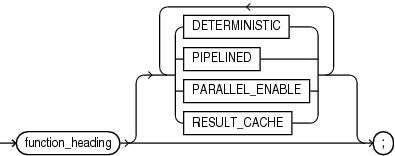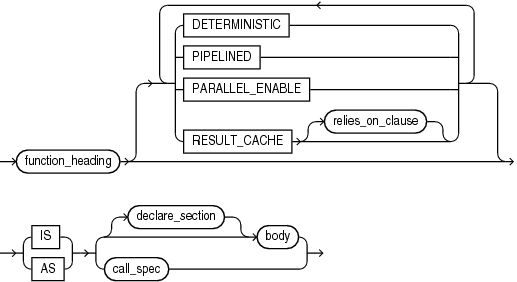14.36 Function Declaration and Definition
Before invoking a function, you must declare and define it. You can either declare it first (with function_declaration) and then define it later in the same block, subprogram, or package (with function_definition) or declare and define it at the same time (with function_definition).
A function is a subprogram that returns a value. The data type of the value is the data type of the function. A function invocation (or call) is an expression, whose data type is that of the function.
A function declaration is also called a function specification or function spec.
Note:
This topic applies to nested functions.
For information about standalone functions, see "CREATE FUNCTION Statement".
For information about package functions, see "CREATE PACKAGE Statement".
Topics
Syntax
function_declaration ::=
function_heading ::=
function_definition ::=
( body ::= , declare_section ::= , pipelined_clause ::= , deterministic_clause ::= , parallel_enable_clause ::= , result_cache_clause ::= , call_spec ::= )
Semantics
function_declaration
Declares a function, but does not define it. The definition must appear later in the same block, subprogram, or package as the declaration.
function_heading
The function heading specifies the function name and its parameter list.
function_name
Name of the function that you are declaring or defining.
RETURN datatype
Specifies the data type of the value that the function returns, which can be any PL/SQL data type (see PL/SQL Data Types).
Restriction on datatype
You cannot constrain this data type (with NOT NULL, for example). If datatype is a constrained subtype, then the returned value does not inherit the constraints of the subtype (see "Formal Parameters of Constrained Subtypes").
function_definition
Either defines a function that was declared earlier or both declares and defines a function.
declare_section
Declares items that are local to the function, can be referenced in body, and cease to exist when the function completes execution.
body
Required executable part and optional exception-handling part of the function. In the executable part, at least one execution path must lead to a RETURN statement; otherwise, a runtime error occurs.
Examples
-
Example 9-2, "Declaring, Defining, and Invoking a Simple PL/SQL Function"


